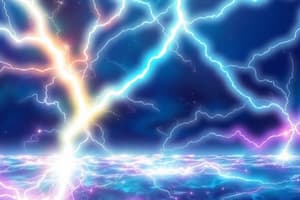Podcast
Questions and Answers
What is the flow of electrons in a closed circuit known as?
What is the flow of electrons in a closed circuit known as?
- Static electricity
- Current electricity (correct)
- Alternating current
- Direct current
What does Georg Ohm's law relate to?
What does Georg Ohm's law relate to?
- Power and current
- Charge and capacitance
- Voltage and energy
- Current, voltage, and resistance (correct)
Which statement about protons is correct?
Which statement about protons is correct?
- They are heavier than electrons. (correct)
- They can move freely through conductors.
- They carry a positive charge. (correct)
- They are located outside the nucleus.
Which material is considered a better conductor of electricity?
Which material is considered a better conductor of electricity?
What happens in a short circuit?
What happens in a short circuit?
What type of electricity is generated by heating the junction of a thermocouple?
What type of electricity is generated by heating the junction of a thermocouple?
What is the SI unit of electric current?
What is the SI unit of electric current?
Which material is considered a good insulator?
Which material is considered a good insulator?
Which type of resistor allows its value to be changed?
Which type of resistor allows its value to be changed?
What does Ohm's law state?
What does Ohm's law state?
What is the total charge transferred by a current of 10 A flowing for 5 minutes?
What is the total charge transferred by a current of 10 A flowing for 5 minutes?
Which law states that the resistance varies directly with the length of the conductor?
Which law states that the resistance varies directly with the length of the conductor?
What is electricity primarily about?
What is electricity primarily about?
Flashcards
What is electric current?
What is electric current?
The flow of electrons through a conductor, typically in a closed circuit.
What are insulators?
What are insulators?
Materials that resist the flow of electric current, preventing electrons from moving freely.
What is voltage?
What is voltage?
The force that causes electrons to flow in a circuit, measured in volts.
What is resistance?
What is resistance?
Signup and view all the flashcards
What are valence electrons?
What are valence electrons?
Signup and view all the flashcards
What is electricity?
What is electricity?
Signup and view all the flashcards
What is an Ampere (A)?
What is an Ampere (A)?
Signup and view all the flashcards
What is a resistor?
What is a resistor?
Signup and view all the flashcards
What is the resistance-length law?
What is the resistance-length law?
Signup and view all the flashcards
What is resistivity?
What is resistivity?
Signup and view all the flashcards
What is Thermoelectricity?
What is Thermoelectricity?
Signup and view all the flashcards
What is a variable resistor?
What is a variable resistor?
Signup and view all the flashcards
What is Ohm's law?
What is Ohm's law?
Signup and view all the flashcards
Study Notes
Electricity Concepts
- Electricity is the flow of electrons in a closed circuit. Current electricity involves the flow of electrons through a conductor.
- Benjamin Franklin linked lightning and static electricity.
- Magnetism can produce electricity requiring a coil and a magnet moving relative to one another.
- Protons, electrons and neutrons are parts of an atom. Electrons have a negative charge, are lighter and found outside the nucleus in shells/orbitals.
- Insulators do not allow charges to move freely.
- Resistance of a material increases with temperature rise.
- Electric current flows from positive to negative in a conventional current flow. However, electrons move in the opposite direction.
- A short circuit occurs when resistance between terminals is very low. This is different from a circuit with no current flow where the resistance is high.
- Direct current (DC) has one-way flow whereas alternating current (AC) periodically reverses its direction.
- Valence electrons are found in the outermost shell of an atom.
- Silver is a better conductor than copper.
- Amperes (A) is a unit of electric current.
- Voltage is measured in volts (V).
- Georg Ohm formulated the law that relates current, voltage and resistance. Ohm's Law: V = IR (Voltage = Current x Resistance)
- Variable resistors allow for changes in resistance within a circuit.
Electricity Generation and Types
- Static and current electricity are two main types of electricity.
- William Gilbert is considered the Father of Electricity.
- Thermoelectricity is generated by heating the junction of a thermocouple.
- Wood is a poor conductor of electricity.
- Michael Faraday demonstrated the generation of electricity through magnetism.
Other Important Concepts
- Atoms: The number of protons in an atom determines the element's atomic number.
- Resistors limit current flow.
- The length of a conductor directly influences its resistance.
- Resistivity is a property increasing with temperature change in a material.
- Heat is not an effect of electric current (but heat can be generated by current passing through a material)
- Calculation of total electric charge transferred using current and time.
Studying That Suits You
Use AI to generate personalized quizzes and flashcards to suit your learning preferences.



